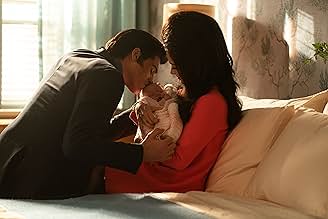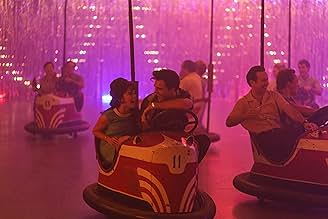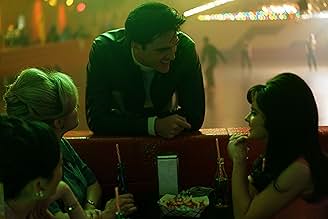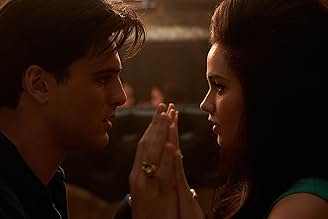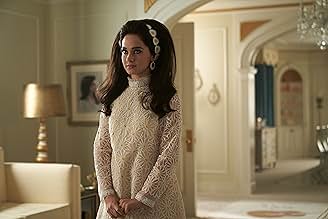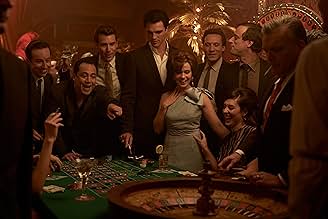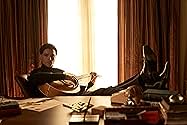Als die junge Priscilla Beaulieu den Rock'n'Roll-Superstar Elvis Presley kennenlernt, entdeckt sie die Privatperson Elvis - ein aufregender Schwarm, ein Verbündeter in der Einsamkeit, ein ve... Alles lesenAls die junge Priscilla Beaulieu den Rock'n'Roll-Superstar Elvis Presley kennenlernt, entdeckt sie die Privatperson Elvis - ein aufregender Schwarm, ein Verbündeter in der Einsamkeit, ein verletzlicher bester Freund.Als die junge Priscilla Beaulieu den Rock'n'Roll-Superstar Elvis Presley kennenlernt, entdeckt sie die Privatperson Elvis - ein aufregender Schwarm, ein Verbündeter in der Einsamkeit, ein verletzlicher bester Freund.
- Regie
- Drehbuch
- Hauptbesetzung
- Auszeichnungen
- 6 Gewinne & 35 Nominierungen insgesamt
Dan Beirne
- Joe
- (as Daniel Beirne)
Empfohlene Bewertungen
When a film seeks to depict the life story of a beloved public figure, it generally works best when it paints a comprehensive portrait of said individual. However, in this biography of the wife of rock icon Elvis Presley, viewers get a picture that seemingly tells only half of the story. Writer-director Sofia Coppola's latest focuses on the years Priscilla Presley (Cailee Spaeny) spent with Elvis (Jacob Elordi). They embark on a sincerely loving relationship that, sadly, falls prey to problems with drugs, firearms, infidelity, prolonged separations and control freak tendencies, conditions - largely initiated by Elvis - that eventually lead to their separation (and at times cause the film to be more about him than her). Regrettably, the choice of this narrative leaves out the many significant personal and professional accomplishments of Priscilla's life on her own, an inspiring story that's completely (and perplexingly) overlooked. As a consequence, viewers are primarily shown a profile of a predominantly subservient character who rarely rebels until she finally somehow musters up the courage to leave (where did that trait come from?), with nothing about the successes that followed. In addition, there are many story threads that feel unresolved or underdeveloped, leaving audiences hanging about what comes from them. To its credit, "Priscilla" is, in several respects, some of the best (though surprisingly most conventional) work that Coppola has produced as a filmmaker, as evidenced in the cinematography and editing and in Elordi's balanced portrayal of Elvis. But, like other of Coppola's efforts, this offering could still use some tidying up in the writing, character development and overall story structure. The wife of a King truly warrants better treatment.
Wow, this was an uncomfortable movie to watch. Priscilla invites inevitable comparisons to last year's "Elvis," portraying an exact opposite narrative. Helmed by the talented Sophia Coppola, who commands great respect, and featuring Jacob Elordi, an actor I admire, the film falls short of expectations. Unfortunately, it presents a one-dimensional, flat perspective that left me somewhat disappointed.
While the performances are strong, and the direction commendable, Priscilla's narrative feels tedious and slow at times. The harrowing depiction of power imbalances in the central relationship adds a layer of discomfort that makes the film hard to watch. Sophia Coppola's artistic choices unveil a side of the characters that, while impactful, renders the viewing experience challenging. Priscilla sheds light on the vulnerability of a young protagonist, emphasizing the discomfort of witnessing a story where she is just a child.
While the performances are strong, and the direction commendable, Priscilla's narrative feels tedious and slow at times. The harrowing depiction of power imbalances in the central relationship adds a layer of discomfort that makes the film hard to watch. Sophia Coppola's artistic choices unveil a side of the characters that, while impactful, renders the viewing experience challenging. Priscilla sheds light on the vulnerability of a young protagonist, emphasizing the discomfort of witnessing a story where she is just a child.
Before Elvis Presley's daughter Lisa Marie passed away earlier this year, she was quite contemptuous over Sofia Coppola's portrayal of her parents in her biographical feature Priscilla. Based on Priscilla Presley's 1985 memoir Elvis and Me, the film has nonetheless garnered mostly positive reviews and even earned Cailee Spaeny the Volpi Cup for Best Actress at the 2023 Venice Film Festival. Given that Priscilla herself was an executive producer on this project, it's best to look at this project at a more earnest portrayal of Elvis and Priscilla instead of it being romanticized or sugar coated.
Now as this film depicts the courtship between a then 14 year old Priscilla and a then 24 year old Elvis, the biggest takeaway from this feature is that it's supposed to comment more on the idea of love being difficult to obtain as the wife of a global superstar. While it does depict a taboo romantic subject in mind, it becomes far more toxic when Elvis proves to be far more manipulative and abusive than his rockstar persona claims otherwise. Cailee Spaeny and Jacob Elordi share quite a conflicting bond as their depictions show a more disturbing underbelly to what the public thought of the Presleys otherwise. Coppola makes sure to emphasize the unfortunate implications behind their relationship without directly endorsing it, especially as we can see how much the spousal torment and jadedness behind the life of fame creates more misery in Priscilla than to the people worried for her like her parents and socialites. Behind all the rock & roll, glamour and pizazz lies a hollow marriage where one is no longer illusioned to much of anything, be it romance or appreciation for the music.
That being said, outside of the disturbing implications behind Priscilla and Elvis' courtship, there really isn't much else to take away from the movie. By putting so much of Priscilla's perspective into the limelight, the portrayal of her husband isn't interesting enough to dissect beyond him being a fake charming guy who more so likes the idea of a soul mate instead of actually being with one consistently. It doesn't help that the film rushes certain plot points just to get to Presley's life of prestige, such as Priscilla's time with her rightfully concerned family, her trouble focusing in school and even the implied drug addictions she and her husband faced. Despite that latter key point playing a big role in Elvis' abusive behavior, it isn't explored enough to leave much of a dramatic impact. In fact, for a film that tries to incorporate themes of domestic abuse, it feels surprisingly lacking in showing much of that tension. Also, once the film ends, it feels as if it missed the opportunity to go more into Priscilla's life after leaving Elvis for good, almost as if it felt it didn't need to tell more when it should have.
Outside of those qualities, the filmmaking is competent enough yet never rises above decently well crafted in depicting the era of subject. The cultural aesthetic of the late 50s and early to mid 60s feels more tact on for the sake of the time period, as outside of some of the road shows and projects Elvis is apart of, only the costuming sticks out the most, and yet the film hardly does much with them to make much of an impression. If anything, the pop cultural influence from this era feels more like an accompaniment to the story than really playing much of a role beyond the media playing up Elvis' life as more than it really is. Also, the lack of much of a background score surprisingly doesn't work as most of the scenes play out with an awkward tension that would have benefited from more than just what's on the soundtrack. Speaking of which, for some reason there are all kinds of retro and contemporary rock and jazz songs except from the king himself. Perhaps given the involvement of Priscilla Presley and her ex-husband's enterprises, this comes off as understandable yet confusing.
So while made with earnest intentions and captivating performances, Priscilla is a decent enough biopic that falls flat in exploring more about its subject matter beyond superficial love and all the glitz and glamour that comes with it. I would recommend this on the grounds that it's more interesting than it is thought provoking, though definitely take that for what it's worth given how much influence was done by the target at hand. Besides, even if the king is no longer looked at the same way he was then, projects like these are good reminders to not look up to everyone you admire, let alone fall for.
Now as this film depicts the courtship between a then 14 year old Priscilla and a then 24 year old Elvis, the biggest takeaway from this feature is that it's supposed to comment more on the idea of love being difficult to obtain as the wife of a global superstar. While it does depict a taboo romantic subject in mind, it becomes far more toxic when Elvis proves to be far more manipulative and abusive than his rockstar persona claims otherwise. Cailee Spaeny and Jacob Elordi share quite a conflicting bond as their depictions show a more disturbing underbelly to what the public thought of the Presleys otherwise. Coppola makes sure to emphasize the unfortunate implications behind their relationship without directly endorsing it, especially as we can see how much the spousal torment and jadedness behind the life of fame creates more misery in Priscilla than to the people worried for her like her parents and socialites. Behind all the rock & roll, glamour and pizazz lies a hollow marriage where one is no longer illusioned to much of anything, be it romance or appreciation for the music.
That being said, outside of the disturbing implications behind Priscilla and Elvis' courtship, there really isn't much else to take away from the movie. By putting so much of Priscilla's perspective into the limelight, the portrayal of her husband isn't interesting enough to dissect beyond him being a fake charming guy who more so likes the idea of a soul mate instead of actually being with one consistently. It doesn't help that the film rushes certain plot points just to get to Presley's life of prestige, such as Priscilla's time with her rightfully concerned family, her trouble focusing in school and even the implied drug addictions she and her husband faced. Despite that latter key point playing a big role in Elvis' abusive behavior, it isn't explored enough to leave much of a dramatic impact. In fact, for a film that tries to incorporate themes of domestic abuse, it feels surprisingly lacking in showing much of that tension. Also, once the film ends, it feels as if it missed the opportunity to go more into Priscilla's life after leaving Elvis for good, almost as if it felt it didn't need to tell more when it should have.
Outside of those qualities, the filmmaking is competent enough yet never rises above decently well crafted in depicting the era of subject. The cultural aesthetic of the late 50s and early to mid 60s feels more tact on for the sake of the time period, as outside of some of the road shows and projects Elvis is apart of, only the costuming sticks out the most, and yet the film hardly does much with them to make much of an impression. If anything, the pop cultural influence from this era feels more like an accompaniment to the story than really playing much of a role beyond the media playing up Elvis' life as more than it really is. Also, the lack of much of a background score surprisingly doesn't work as most of the scenes play out with an awkward tension that would have benefited from more than just what's on the soundtrack. Speaking of which, for some reason there are all kinds of retro and contemporary rock and jazz songs except from the king himself. Perhaps given the involvement of Priscilla Presley and her ex-husband's enterprises, this comes off as understandable yet confusing.
So while made with earnest intentions and captivating performances, Priscilla is a decent enough biopic that falls flat in exploring more about its subject matter beyond superficial love and all the glitz and glamour that comes with it. I would recommend this on the grounds that it's more interesting than it is thought provoking, though definitely take that for what it's worth given how much influence was done by the target at hand. Besides, even if the king is no longer looked at the same way he was then, projects like these are good reminders to not look up to everyone you admire, let alone fall for.
Early in Sofia Coppola's languid distillation of Priscilla Presley's life with Elvis, she receives a beautifully coiffed and presented gift of a pet poodle. Priscilla (Cailee Spaeny) had recently moved into Graceland when she gets the present. 14 when they met in Germany, Priscilla was still only 17. She coddles the pooch and treats it like a little princess. Coppola (who wrote the screenplay adapted from Priscilla's book) makes a case that Elvis (Jacob Elordi) viewed his then future wife as a type of possession. When the teenager asks for permission to take a part-time job, the musician forbades it saying that he needs her to be available whenever he desires. Like the dog, Priscilla is always to be primped and pampered to its owner's specifications.
One could say that PRISCILLA represents the other side of Baz Luhrman's recent phantasmagorical film ELVIS in both style and POV. That's certainly true in many ways, but it's doubtful that Coppola would have made her movie much differently even if Luhrman's film didn't exist. Phillipe La Sourd's cinematography, Tamara Deverell's Production Design and Stacey Battat's costuming all fit nicely within Coppola's aesthetic. The filmmaker's love of pop music is also fully on display with period songs mixed freely with more recent tunes in a similar vein (the movie begins with The Ramones and fades out with Dolly Parton).
Coppola has rarely been an auteur interested in pure plot and narrative drive. She prefers to soak the viewer into the milieu of her characters. On that level, PRISCILLA has a certain effectiveness. Neither Spaeny nor Elordi are stars, but, their anonymity adds to their relatability. Elordi in particular, faces not only comparisons to Austin Butler's ebullient Oscar nominated performance, but decades of imitators. He humanizes the mythic figure even if, at a certain point, his lack of flash reduces the King of Rock 'N Roll to too much the mere mortal. The elephant in the room is, of course, that Elvis would be considered persona non grata in today's climate. When Priscilla first enters Graceland, Elvis' ever-present entourage are taken aback at how young she looks. Coppola exaggerates the difference by casting actors over a foot apart in height (the real difference was closer to 8"). It does make her look like a little girl (and Spaeny convincingly pulls it off despite being only a year younger than Elordi; Elvis was a decade Priscilla's senior). In Coppola (and Priscilla's) telling, Elvis isn't portrayed as making his young wife into a purely sexual object. He kept her under glass in his misguided notion that he was protecting her. To make her into an idealized good Christian girl and modern Southern belle who his recently deceased mama could have been proud of. It's an extraordinary tricky balance - particularly with the real Priscilla being a Producer on this film.
By design, PRISCILLA never takes a truly deep look at all the details of the couple's lives. Colonel Tom Parker is only vaguely alluded to. The viewer sees Elvis performing only near the very end, and briefly. Once at Graceland, Priscilla is barely shown with anyone other than Elvis' posse. The movie only spans the years they were together. It's a very insular movie which relies heavily on mood and atmosphere. It will be up to each individual viewer if that is sufficient.
One could say that PRISCILLA represents the other side of Baz Luhrman's recent phantasmagorical film ELVIS in both style and POV. That's certainly true in many ways, but it's doubtful that Coppola would have made her movie much differently even if Luhrman's film didn't exist. Phillipe La Sourd's cinematography, Tamara Deverell's Production Design and Stacey Battat's costuming all fit nicely within Coppola's aesthetic. The filmmaker's love of pop music is also fully on display with period songs mixed freely with more recent tunes in a similar vein (the movie begins with The Ramones and fades out with Dolly Parton).
Coppola has rarely been an auteur interested in pure plot and narrative drive. She prefers to soak the viewer into the milieu of her characters. On that level, PRISCILLA has a certain effectiveness. Neither Spaeny nor Elordi are stars, but, their anonymity adds to their relatability. Elordi in particular, faces not only comparisons to Austin Butler's ebullient Oscar nominated performance, but decades of imitators. He humanizes the mythic figure even if, at a certain point, his lack of flash reduces the King of Rock 'N Roll to too much the mere mortal. The elephant in the room is, of course, that Elvis would be considered persona non grata in today's climate. When Priscilla first enters Graceland, Elvis' ever-present entourage are taken aback at how young she looks. Coppola exaggerates the difference by casting actors over a foot apart in height (the real difference was closer to 8"). It does make her look like a little girl (and Spaeny convincingly pulls it off despite being only a year younger than Elordi; Elvis was a decade Priscilla's senior). In Coppola (and Priscilla's) telling, Elvis isn't portrayed as making his young wife into a purely sexual object. He kept her under glass in his misguided notion that he was protecting her. To make her into an idealized good Christian girl and modern Southern belle who his recently deceased mama could have been proud of. It's an extraordinary tricky balance - particularly with the real Priscilla being a Producer on this film.
By design, PRISCILLA never takes a truly deep look at all the details of the couple's lives. Colonel Tom Parker is only vaguely alluded to. The viewer sees Elvis performing only near the very end, and briefly. Once at Graceland, Priscilla is barely shown with anyone other than Elvis' posse. The movie only spans the years they were together. It's a very insular movie which relies heavily on mood and atmosphere. It will be up to each individual viewer if that is sufficient.
It is 1949, and American teenager Priscilla Beaulieu is in Germany with her parents. At a party one night, she meets Elvis Presley, who is stationed in the same military base as her father. The King is drawn to her, while she is smitten by his down-to-earth charm and seemingly genuine humanity. As time goes on, the two forge a relationship, and by 1963, she is living with him in Memphis. However, being The King's wife proves more difficult than she imagined, and far more lonesome.
Written and directed by Sofia Coppola, and based on 'Elvis and Me' by Priscilla Presley and Sandra Harmon, 'Priscilla' is a visually evocative drama both striking and flawed. Firstly, the title is something of a misnomer, as this is not the story of Priscilla Presley's life, rather an overview of the years she spent with Elvis (one wonders why the source material's title was not retained). The narrative focuses on her growing isolation, trapped in Graceland, at the beck and call of her controlling husband. However, due to Coppola's cold approach to the themes of agency and control, her examination of same leaves one oddly unmoved.
Moreover, despite the fact that she is ostensibly the central character, we aren't offered insight into Priscilla's motivations, or aspirations, nor does she have much of a personality. She is a soft-spoken, kind-hearted girl at the beginning and- for all intents and purposes- the very same at the end. Coppola's dialogue lacks wit, while Sarah Flack's ponderous editing leaves proceedings feeling lethargic- all the more so due to the dearth of characterisation and dialogue therein.
Some critics are quick to state that the film is purposefully superficial, that Coppola is interested only in the surface level. By focusing on the skin, as it were, and not the heart beneath, she re-enforces the idea that everything in Elvis's life was an easily purchasable object, even Priscilla. However, as the title would suggest, this is not meant to be a movie about Elvis. Therefore, the scant character development or depth with regard to Priscilla is alienating. We don't have much reason to root for her, except as a result of the obvious distaste engendered by Elvis's mood swings and controlling behaviour.
As a result, the audience feels detached from proceedings, disconnected from the characters both emotionally and psychologically. Although Coppola creates a more human version of The King than viewers saw in Baz Luhrman's 'Elvis' or Liza Johnson's 'Elvis & Nixon', by demythologizing and bringing him down to earth, much of his charisma is diluted. The film's version of the man is a brooding, volatile control freak, without much magnetism or charm. Furthermore, secondary characters are barely more than shadows in darkness; you can hardly make them out at all.
Conversely, Coppola - and frequent collaborator Philippe Le Sourd's - cinematography is stunning. Their composition makes Priscilla appear small and out of place compared to Elvis, like a China doll discarded in a playground. Their use of juxtaposing colours adds to the luxury of Graceland, as well as to Priscilla's isolation, while the soft lighting throughout lends the film an air of romance and intimacy. Everything in the film drips with textural richness, immersing the viewer in a lavish, decadent world, where every surface glistens with silk, velvet and gold.
In addition, Stacey Battat's costume design contributes to the personalities of the characters astutely (perhaps more so than Coppola's screenwriting), heightening the visual contrast between Elvis and Priscilla. Her costume, makeup and hairstyle changes, in particular, mirror her evolution from a shy girl to an independent woman- even if Coppola's screenplay doesn't detail that journey; Priscilla's varying appearance does. Additionally, Tamara Deverell's intricate production design- as well as the set decoration from Patricia Cuccia- lends the film authenticity and realism.
Moreover, the soundtrack is stirring, utilising both modern and period pieces. Although Elvis's estate refused permission for any of his songs to be used, Coppola makes excellent use of tracks by the likes of Dolly Parton and The Ronettes, bolstering the narrative's themes. Contemporary music is interwoven cleverly into proceedings, never feeling as jarring and out of place as it does in the aforementioned Luhrman's efforts, complementing things nicely.
Cailee Spaeny stars as Priscilla, opposite Jacob Elordi as Elvis. Spaeny displays Priscilla's innocence subtly, being nuanced and understated. Although there really isn't much for her to work with, she overcomes the limited characterisation of the role, while handling dull dialogue with ease. Similarly, Elordi makes Coppola's angsty, moody version of Elvis an interesting, multifaceted character. He might not really look like The King, but he shares a good chemistry with Spaeny. Unfortunately, a parade of supporting actors- notably Dagmara Dominczyk and Ari Cohen as Priscilla's parents- are largely wasted, given little to do.
In conclusion, Sofia Coppola's 'Priscilla' is trying to say some interesting things about fame, agency and control, but never gets around to saying them. Coppola's narrative is too cold and calculated, while her characterisation and dialogue are too minimalist to make much impact. Conversely, the cinematography and production design are striking, while the stirring score complements proceedings cleverly. Cailee Spaeny does fine work as the titular character, as does her co-star Jacob Elordi as Elvis. Although it has its moments, it's a moody blue film that suspicious minds might want to return to sender.
Written and directed by Sofia Coppola, and based on 'Elvis and Me' by Priscilla Presley and Sandra Harmon, 'Priscilla' is a visually evocative drama both striking and flawed. Firstly, the title is something of a misnomer, as this is not the story of Priscilla Presley's life, rather an overview of the years she spent with Elvis (one wonders why the source material's title was not retained). The narrative focuses on her growing isolation, trapped in Graceland, at the beck and call of her controlling husband. However, due to Coppola's cold approach to the themes of agency and control, her examination of same leaves one oddly unmoved.
Moreover, despite the fact that she is ostensibly the central character, we aren't offered insight into Priscilla's motivations, or aspirations, nor does she have much of a personality. She is a soft-spoken, kind-hearted girl at the beginning and- for all intents and purposes- the very same at the end. Coppola's dialogue lacks wit, while Sarah Flack's ponderous editing leaves proceedings feeling lethargic- all the more so due to the dearth of characterisation and dialogue therein.
Some critics are quick to state that the film is purposefully superficial, that Coppola is interested only in the surface level. By focusing on the skin, as it were, and not the heart beneath, she re-enforces the idea that everything in Elvis's life was an easily purchasable object, even Priscilla. However, as the title would suggest, this is not meant to be a movie about Elvis. Therefore, the scant character development or depth with regard to Priscilla is alienating. We don't have much reason to root for her, except as a result of the obvious distaste engendered by Elvis's mood swings and controlling behaviour.
As a result, the audience feels detached from proceedings, disconnected from the characters both emotionally and psychologically. Although Coppola creates a more human version of The King than viewers saw in Baz Luhrman's 'Elvis' or Liza Johnson's 'Elvis & Nixon', by demythologizing and bringing him down to earth, much of his charisma is diluted. The film's version of the man is a brooding, volatile control freak, without much magnetism or charm. Furthermore, secondary characters are barely more than shadows in darkness; you can hardly make them out at all.
Conversely, Coppola - and frequent collaborator Philippe Le Sourd's - cinematography is stunning. Their composition makes Priscilla appear small and out of place compared to Elvis, like a China doll discarded in a playground. Their use of juxtaposing colours adds to the luxury of Graceland, as well as to Priscilla's isolation, while the soft lighting throughout lends the film an air of romance and intimacy. Everything in the film drips with textural richness, immersing the viewer in a lavish, decadent world, where every surface glistens with silk, velvet and gold.
In addition, Stacey Battat's costume design contributes to the personalities of the characters astutely (perhaps more so than Coppola's screenwriting), heightening the visual contrast between Elvis and Priscilla. Her costume, makeup and hairstyle changes, in particular, mirror her evolution from a shy girl to an independent woman- even if Coppola's screenplay doesn't detail that journey; Priscilla's varying appearance does. Additionally, Tamara Deverell's intricate production design- as well as the set decoration from Patricia Cuccia- lends the film authenticity and realism.
Moreover, the soundtrack is stirring, utilising both modern and period pieces. Although Elvis's estate refused permission for any of his songs to be used, Coppola makes excellent use of tracks by the likes of Dolly Parton and The Ronettes, bolstering the narrative's themes. Contemporary music is interwoven cleverly into proceedings, never feeling as jarring and out of place as it does in the aforementioned Luhrman's efforts, complementing things nicely.
Cailee Spaeny stars as Priscilla, opposite Jacob Elordi as Elvis. Spaeny displays Priscilla's innocence subtly, being nuanced and understated. Although there really isn't much for her to work with, she overcomes the limited characterisation of the role, while handling dull dialogue with ease. Similarly, Elordi makes Coppola's angsty, moody version of Elvis an interesting, multifaceted character. He might not really look like The King, but he shares a good chemistry with Spaeny. Unfortunately, a parade of supporting actors- notably Dagmara Dominczyk and Ari Cohen as Priscilla's parents- are largely wasted, given little to do.
In conclusion, Sofia Coppola's 'Priscilla' is trying to say some interesting things about fame, agency and control, but never gets around to saying them. Coppola's narrative is too cold and calculated, while her characterisation and dialogue are too minimalist to make much impact. Conversely, the cinematography and production design are striking, while the stirring score complements proceedings cleverly. Cailee Spaeny does fine work as the titular character, as does her co-star Jacob Elordi as Elvis. Although it has its moments, it's a moody blue film that suspicious minds might want to return to sender.
Wusstest du schon
- WissenswertesElvis Presley Enterprises declined both their approval for Sofia Coppola's film and their permission to use Elvis Presley's songs in the film. Coppola then took to creative alternatives, including contemporary music by her husband's band, Phoenix, and cover versions of songs from the film's era.
- PatzerThe title superimposed over the opening scene is "US Air Force Base West Germany 1959" over an image of a 50 star flag. This should have been a 48 or 49 star flag. Although Hawaii had been admitted to the union on August 21, 1959, the new flag was not officially raised until July 4, 1960.
- Crazy CreditsA photo of the crew is shown after the end credits.
- VerbindungenFeatured in The Making of Priscilla (2023)
- SoundtracksGoing Home
Written by Alice Coltrane and Carlos Santana
Performed by Alice Coltrane
Courtesy of Verve Records under license from Universal Music Enterprises
Top-Auswahl
Melde dich zum Bewerten an und greife auf die Watchlist für personalisierte Empfehlungen zu.
Seen On Screen: Elvis and Priscilla Presley
Seen On Screen: Elvis and Priscilla Presley
IMDb looks back at when both Elvis and Priscilla Presley have been portrayed by actors on screen, plus a few times the King and his wife played their own parts.
- How long is Priscilla?Powered by Alexa
Details
- Erscheinungsdatum
- Herkunftsländer
- Offizieller Standort
- Sprachen
- Auch bekannt als
- Прісцилла
- Drehorte
- Produktionsfirmen
- Weitere beteiligte Unternehmen bei IMDbPro anzeigen
Box Office
- Budget
- 20.000.000 $ (geschätzt)
- Bruttoertrag in den USA und Kanada
- 20.960.939 $
- Eröffnungswochenende in den USA und in Kanada
- 132.139 $
- 29. Okt. 2023
- Weltweiter Bruttoertrag
- 33.113.832 $
- Laufzeit1 Stunde 53 Minuten
- Farbe
- Sound-Mix
- Seitenverhältnis
- 1.85 : 1
Zu dieser Seite beitragen
Bearbeitung vorschlagen oder fehlenden Inhalt hinzufügen








